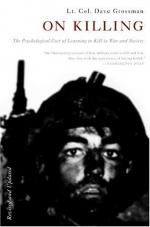
|
| Name: _________________________ | Period: ___________________ |
This test consists of 15 multiple choice questions and 5 short answer questions.
Multiple Choice Questions
1. In Chapter 4, the story of the soldier who kills a young enemy and immediately breaks down crying takes place in what country?
(a) The Soviet Union.
(b) Korea.
(c) Israel.
(d) France.
2. Which of the following is a component of Demands of Authority as delineated in Chapter 1?
(a) Weaponry possessed by commander.
(b) Personal relationship with commander.
(c) Intensity of demand to kill.
(d) Number of orders given.
3. Which Civil War officer does Grossman quote at the beginning of Chapter 5?
(a) McClellen.
(b) Jackson.
(c) Sherman.
(d) Pickett.
4. What term arose in the early 1990's to describe the new fighting techniques seen in the Gulf War?
(a) Mail-order war.
(b) Telegraph war.
(c) Nintendo war.
(d) Calling-card war.
5. According to Grossman in Chapter 4, an effective strategy in defeating an enemy's ability to make war is in destroying what?
(a) Their morale.
(b) Their infrastructure.
(c) Their equipment.
(d) Their numbers.
6. What percentage of casualties did cannon fire comprise in many Civil War battles?
(a) 23.
(b) 50.
(c) 10.
(d) 4.
7. In Chapter 1, Grossman reveals that the majority of active World War II soldiers did what?
(a) Learned German.
(b) Released prisoners-of-war.
(c) Declined to fire their weapons.
(d) Self-harm.
8. During World War I, what was the favored weapon of American servicemen for killing enemy combatants?
(a) Rifles.
(b) Grenades.
(c) Mines.
(d) Bayonet.
9. In Chapter 2, what is significant about the Civil War muskets examined by Grossman?
(a) They are unloaded.
(b) They are loaded without pellets.
(c) They are loaded multiple times.
(d) They are loaded without powder.
10. In Chapter 2, what tactic does Grossman describe as key to training soldiers to fire in combat?
(a) Drilling.
(b) Education.
(c) Alcohol.
(d) Encouragement.
11. In the mythology cited at the end of Chapter 7, who is born of the marriage of Aries and Aphrodite?
(a) Harmonia.
(b) Persephone.
(c) Athena.
(d) Nyx.
12. In regards to war, what group of people does Grossman say in Chapter 1 is most distanced in their decision-making?
(a) Politicians.
(b) Generals.
(c) Petty officers.
(d) Contractors.
13. What do most historians agree was the key to the Roman military model's success?
(a) Longer spears.
(b) Light, flexible armor.
(c) Political legitimacy.
(d) Strong leadership.
14. According to Grossman in Chapter 2, who is often given the cold shoulder in the military?
(a) Snipers.
(b) Diplomats.
(c) Grunts.
(d) Newly-commisioned officers.
15. In Chapter 2, what civilian activity does Grossman use to illustrate the distance-guilt relationship?
(a) Corporate layoffs.
(b) Rape.
(c) Urban crime.
(d) Eating meat.
Short Answer Questions
1. In Chapter 3, an Israeli study says a hostage is much more likely to die if what?
2. According to Grossman in Chapter 3, why would racially and ethnically dominant rhetoric by American leaders have been unhelpful in the Iraq War?
3. In Chapter 3, Grossman says what two stimuli most often impel soldiers to kill?
4. According to Grossman at the end of Chapter 1, what is not widely known about CW Whittlesley, the commander of the Lost Battalion?
5. According to Grossman at the end of Chapter 5, on which individual are the affects of horror in combat most psychologically damaging?
|
This section contains 532 words (approx. 2 pages at 300 words per page) |

|




